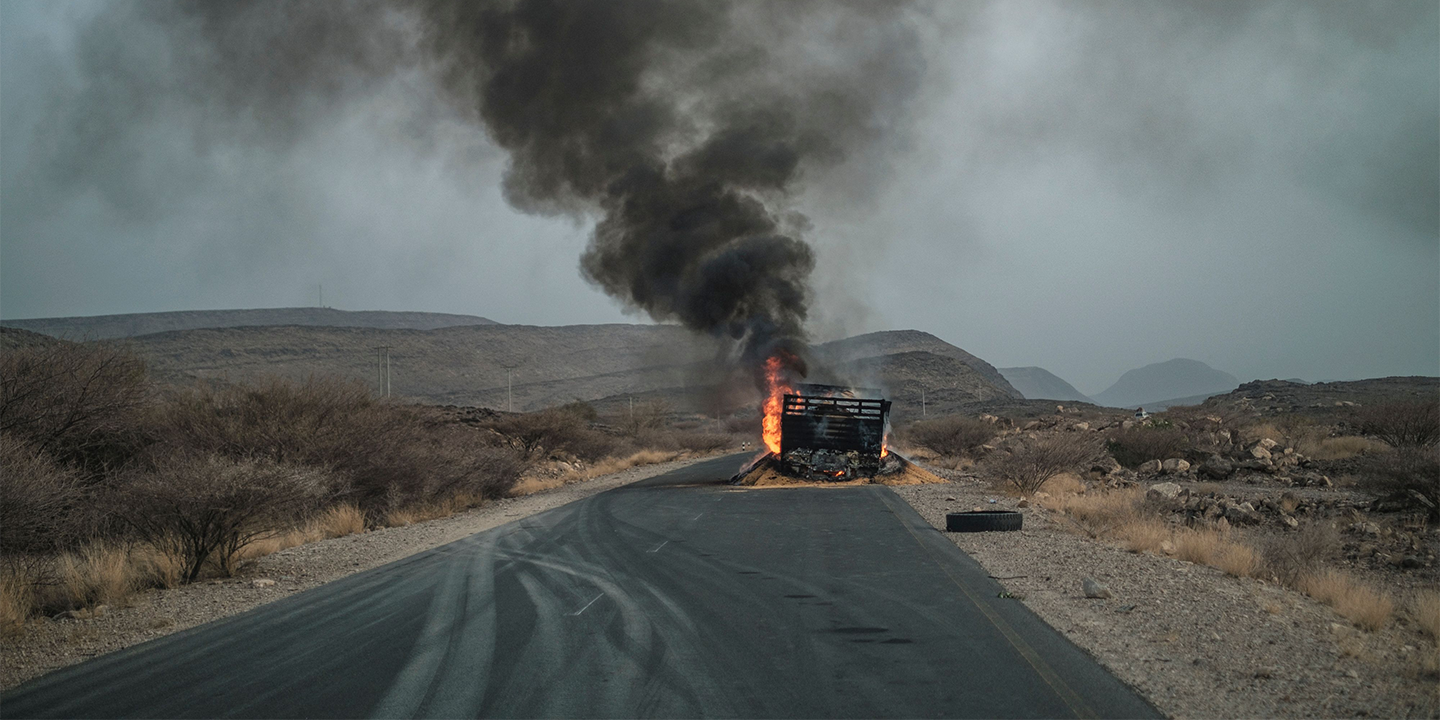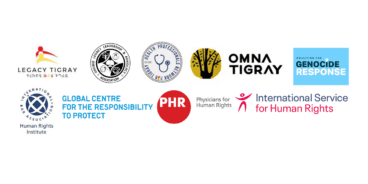

Atrocity Alert No. 320: Ethiopia, Cameroon and Myanmar (Burma)
Atrocity Alert is a weekly publication by the Global Centre for the Responsibility to Protect highlighting situations where populations are at risk of, or are enduring, mass atrocity crimes.
AIR AND DRONE STRIKES KILL DOZENS OF CIVILIANS IN ETHIOPIA’S NORTHERN TIGRAY REGION
Dozens of civilians have been killed in Ethiopia’s northern Tigray region as airstrikes have reportedly targeted civilian areas in the capital, Mekelle, and towns across the region in recent weeks. On 27 September at least five civilians were killed and 16 others injured by a reported airstrike on the town of Adi Daero in northwestern Tigray. On 14 September two drone strikes targeted Mekelle, killing at least 10 civilians and hitting and injuring first responders as they tended to the wounded, according to local hospitals.
These deadly airstrikes are the latest to target civilian areas since the resumption of conflict in Tigray on 24 August. While the Ethiopian federal government claims to have targeted only combatants and military objectives, humanitarian workers have stated otherwise. The hostilities have prevented much-needed humanitarian aid from entering Tigray, putting the 5.2 million people in need of aid at heightened risk of famine and starvation.
Attacks against Tigrayans by neighboring Eritrean forces have also intensified the risk of atrocities. Multiple UN reports and investigations by international human rights groups have previously accused Eritrean forces of atrocities throughout their involvement in the war in northern Ethiopia, including gang rape and other sexual violence, targeting of refugees, refugee camps and humanitarian aid, as well as indiscriminate attacks on civilians.
On 5 October the African Union announced that the federal government had accepted an invitation to peace talks scheduled for this weekend and is awaiting a response from Tigrayan representatives. In mid-September Tigrayan authorities said they were prepared to participate in negotiations to ensure that “Ethiopians in general and the people of Tigray in particular no longer hear the sound of gunfire and the blockade of essential services and humanitarian aid.”
Meanwhile, in their first report to the UN Human Rights Council (HRC), the International Commission of Human Rights Experts on Ethiopia (ICHREE) found that since the conflict began in November 2020 all parties have committed war crimes, including ethnic based attacks on civilians, rape and sexual violence and the destruction of civilian infrastructure. The ICHREE determined that the federal government’s blockade of humanitarian aid from the Tigray region amounts to crimes against humanity. Due to time and funding constraints, the ICHREE highlighted other areas that merit further investigation, including airstrikes, large-scale killings in the Tigray and Oromia regions, the situation in the Afar region and arbitrary detentions, among others.
This week the HRC will decide on a resolution to renew the mandate of the ICHREE. Savita Pawnday, Executive Director of the Global Centre for the Responsibility to Protect, said, “the ICHREE is the only internationally mandated body investigating past and ongoing atrocities in northern Ethiopia, providing hope to victims that one day they will be able to realize their rights to justice and reparation. We implore HRC members to renew the important mandate of the ICHREE and ensure full funding of its budget.”
THOUSANDS OF PEOPLE PROTEST FOR PEACE IN CAMEROON DURING OCTOBER
In recent days thousands of people have taken to the streets in Cameroon’s capital, Yaoundé, to call for a peaceful solution to the armed conflict that began six years ago this month in the Anglophone regions. The daily marches began on Friday, 30 September, and continued until Tuesday, with protesters calling attention to the violations and abuses endured by populations, including killings, abductions and rapes, as the conflict continues across the north-west and south-west regions.
Protest marches are typical during this time of year as October marks several important anniversaries. Six years ago, on 11 October, lawyers, students and teachers in Cameroon began protesting their cultural marginalization by the Francophone-dominated government, leading to a violent crackdown by security forces. One year later, Anglophone separatists proclaimed independence and declared a new state of “Ambazonia” in the north-west and south-west regions. Since then, armed separatists and Cameroonian security forces have continued to clash, resulting in widespread abuses against the civilian population by both sides to the conflict. More than 6,000 people have been killed since 2016.
This month also marks the third anniversary since President Paul Biya launched a National Dialogue aimed at finding solutions to the conflict. Although the Cameroonian government has deemed the dialogue a success, the situation in the Anglophone regions has further deteriorated. In the past year, armed separatists have become increasingly violent, killing, kidnapping and terrorizing populations while steadily asserting control over large parts of the Anglophone regions. Security forces have continued to perpetrate extrajudicial killings and widespread sexual and gender-based violence, burn Anglophone villages and subject individuals with suspected separatist ties to arbitrary detention, torture and ill-treatment.
Despite the continued escalation of the conflict and increasing atrocity risks, the government of Cameroon – as well as the international community – have been unable or unwilling to take effective action. The government continues to deny the severity of the crisis and has failed to address the root causes of the conflict or provide a political means for resolving it. Juliette Paauwe, Cameroon Expert at the Global Centre for the Responsibility to Protect, stated, “what started as a political crisis has become a complex human rights and humanitarian emergency, disproportionally affecting vulnerable populations, including women and children. The conflict warrants concerted efforts by the Cameroonian government and the international community to prevent any further deterioration.” The African Union’s Peace and Security Council and the UN Security Council should urgently help facilitate a ceasefire and inclusive dialogue between the government and separatist groups, mediated by a neutral player on neutral territory.
NEW REPORT FINDS FACEBOOK “SUBSTANTIALLY CONTRIBUTED” TO ROHINGYA GENOCIDE
According to a new report by Amnesty International, Facebook’s systems “substantially contributed” to the atrocities, including genocide, by Myanmar’s (Burma) military against the minority Rohingya population in 2017. Facebook’s content-shaping algorithmic systems amplified and promoted anti-Rohingya content, including hate speech and disinformation that incited violence, hatred and discrimination. Myanmar activists regularly raised concerns with Meta – Facebook’s owner – regarding these issues as early as 2012, approximately five years before the military launched so-called “clearance operations” against the Rohingya, which were characterized by indiscriminate killings, torture, arbitrary detention, sexual violence and forced displacement.
Agnes Callamard, Amnesty International’s Secretary General, stated, “in the months and years leading up to the atrocities, Facebook’s algorithms were intensifying a storm of hatred against the Rohingya which contributed to real-world violence… While the Myanmar military was committing crimes against humanity against the Rohingya, Meta was profiting from the echo chamber of hatred created by its hate-spiralling algorithms.”
According to the report, the responsibility of Meta extends beyond passivity into the realm of commission. Meta has admitted to its negligence and has taken several steps to combat hate speech on the platform, including by banning Myanmar’s military from Facebook and creating a team of Burmese speakers to moderate content. Despite these steps, the company must strengthen its efforts to tackle the spread of hate speech, disinformation and misinformation. A March 2022 investigation by the advocacy group Global Witness found that Facebook continued to approve advertisements containing hate speech that incited violence against Rohingya populations.
In 2018 the UN’s Independent International Fact-Finding Mission on Myanmar noted that Facebook had served a “determining role” in fueling atrocities against the Rohingya in a country where “Facebook is the internet.” In December 2021 a group of Rohingya refugees in the United States and United Kingdom sued Facebook over its role in failing to prevent the spread of hate speech, exacerbating the violence against the Rohingya. At that time, a spokesperson for Meta said the company was “appalled by the crimes committed against the Rohingya people.”
Liam Scott, Myanmar Expert at the Global Centre for the Responsibility to Protect, said, “Amnesty’s new report underscores the significant role that online hate speech and disinformation serves in the commission of atrocity crimes.” As Amnesty recommended in the report, Meta must provide reparations to all those who have faced violence in Myanmar as a result of the company’s failure. Moreover, Meta and other Big Tech companies have an obligation to uphold their human rights responsibilities and should take concrete steps to address their culpability in the commission of atrocity crimes.

